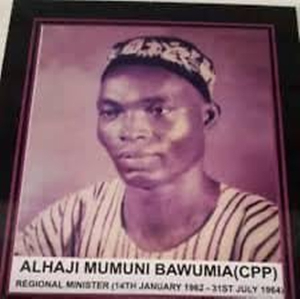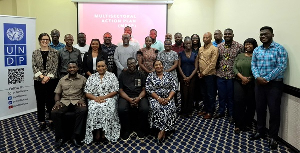MODERNISING AND RESTRUCTURING GHANA’S ECONOMY:
IDEOLOGY OR PRAGMATIC INNOVATION?
PART II
Emerging new opportunities
With Ghana beginning to now exhibit most of the positive characteristics of the
early independence period, it is believed that an alternative model for state
involvement in the modernisation and restructuring of the Ghanaian economy is
needed.
With the fall of communism and the ascendancy of liberal economics as the
predominant way of organising a country’s economic affairs, the debate about using
socialistic frameworks to pursue Ghana’s development agenda is mute even if there
are still some segments of society that would seek, for nostalgic reasons, relating
to their association to the ideas of Nkrumah, for a reversion to state socialism[9].
Active state involvement in the economy has grown out of fashion and historically,
has proven ineffectual, despite the ingenious argument by some commentators that the
recent nationalisation of private assets in Europe and the United States of America
following the financial crisis of 2008 is a reversion to global socialism.
We therefore argue in favour of the modern registered corporation which
has since its evolution from the statutory and charter companies of the
nineteenth century continued to be one of the most desirable forms of
business organisation because of its utility for raising capital from a
larger shareholder base, the limited liability it gives to shareholders,
and the entrepreneurial spirit it liberates for managers to take
business risks.
Just like nineteenth century Europe and United States where the use of the company
galvanised successful development of business ventures in telecommunication and
transportation, conditions in Ghana are primed for the use of the vehicle of the
company to undertake large scale commercial ventures for viable projects that are
necessary for the development of Ghana but for which the government is itself unable
to undertake.
Considerable savings exist within the Ghanaian society[10], although because of
historical conditions relating to the state’s disregard for private property most of
it is held outside the formal banking system; there is also an overwhelming need for
major projects to be initiated to tap Ghana’s natural resources as well as utilise
the opportunities of its locational advantage; further, innovative technologies
pervade to avail business opportunities, with globalisation providing the needed
leverage; and Ghana abounds in managerial expertise for all these ventures through
its rich stock of human capital, both home and in the diaspora.
As argued by the Law and Development movement, and effectively championed by the
international financial institutions in Ghana and several other developing
countries, particularly in the 1980s and 1990s, the development of appropriate legal
frameworks is necessary if investments are to be attracted into a country.
Regrettably this postulation has been interpreted and pursued with a Western law
bias.
La Porta et. al. [1998,1999, 2000] have also argued that legal protection for
business owners, including shareholders, are crucial in determining whether a
market-based economy in which a managerial controlled and dispersed
shareholder-owned corporation[11] would develop.
Undoubtedly, the civilian democratic tradition of Ghana and the principles of the
1992 Constitution of the Republic of Ghana provide clear legal frameworks for
private businesses to operate, and assures ample confidence about the obligations
incumbent upon the State not to expropriate private property.
A new model for state involvement in the economy
It is therefore argued that a new model for the state’s involvement in the Ghanaian
economy is required, a model we call the Lift and Push model, where rather than
attempting to set up industries on its own, or leaving the private sector alone to
initiate their own undertakings, the state rather facilitates, through its agents,
the promotion of business ventures with mass Ghanaian shareholding.
In a sense the model is not entirely new, for during the government of
John Agyekum Kufuor the Ayensu Starch Factory was established along
similar lines, under the so-called Presidential Special Initiatives
programme, whereby cassava plantation farmers in the central region were
assisted to incorporate an entity for the processing of cassava into
industrial starch. It was however not systematically developed to
provide the needed credibility for it to sustain and it has also
suffered some political backlash.
What the Lift and Push model requires is a focus on two key issues.
First, acting under the mandate of article 192 of the 1992 Constitution of the
Republic of Ghana, the Ghanaian government should establish a small statutory
corporation with a clear mandate for developing strategic and viable business
ventures and promoting, solely for Ghanaian subscription, public companies for the
purpose of engaging in those projects.
The organisational structure of the statutory corporation should be such that it is
given political independence, save the broad directives given in its establishment
act only. Consequently, though it might initially be funded from the national budget
of Ghana, its organisational structure at the level of the board should be
a-governmental. The board could comprise representatives from constituent
stakeholders such as those from the investment houses, pension and insurance
companies, indigenous business associations, and Ghanaian business experts appointed
by an independent search committee. The Chief Executive Officer and senior
management should also be a-governmental and should be appointed solely by the
board, on a clear-cut competency based criteria.
Secondly, in its operations of promoting new business ventures, the statutory
company would need to hem in on areas such as infrastructure development of tolled
roads, railways, ports, and airports, within well-established and agreed principles
of public private partnerships. But equally important, it would also need to promote
value-added industrial platforms like agro-processing ventures such as cocoa, shea
butter and starch processing; refining of all of Ghana’s gold before exports, and
cutting and polishing of diamonds; processing of salt, caustic soda; and, taking
advantage of Ghana’s new foothold in the oil and gas industry, petro-chemical
industries. This should not, however, exclude tie-up ventures that can be
established in innovative industries such as electronics, leveraging the advantages
of globalisation.
The ventures to be promoted should have clear business plans, showing projected
costs for machinery and working capital, break-even analysis, the types of
managerial and other technical expertise required, and the expected returns to
investing Ghanaian nationals. All pre-incorporation contracts should be minimally
done, but letters of intent or memoranda of understanding to secure both domestic
and external sales should be worked out. Being in a fiduciary role, the statutory
company would need to work in the best interest of the putative company; bearing in
mind the national imperatives that have occasioned this policy option.
Indeed, considering the limited market size of Ghana, it would be clear that any of
the ventures to be promoted, aside those to be incorporated for infrastructure
development in Ghana, would need to have a predominant export orientation that also
takes account of the country’s competitive advantage attributes such as factor
endowment, demand conditions, relating and supporting industries, etc. [Porter,
1990].
The managerial concerns of these putative companies would also need to be addressed,
in their articles of association, to ensure that managers work for the benefit of
their owners and are mindful of their actions on other stakeholders.
Benefits of the Lift and Push Model
Studies conducted in recent years in developed markets, including the Freedman
studies done in the United Kingdom, confirm that small businesses account for the
highest number of registered companies and make significant contributions to
economic growth and prosperity. It is however argued here that these small
businesses thrive because there are opportunities created by larger public companies
through forward and backward linkages and the provision of services. Similarly, the
creation of these new companies in Ghana would have multiplier effects as smaller
companies come up to service their needs. The goal for a modern and diversified
economy would therefore be on course.
Also, the creation of these new indigenous companies to exploit business
opportunities in Ghana would result in a shift from import consumption to domestic
investment, create new jobs and additional employment, improve income levels, and
help assure social stability. The experience worldwide suggests that jobs everywhere
are best created by companies bottom-up, not top-down by governments.
Further benefits of this model is that whereas in the past private indigenous
businesses have suffered at the hands of incumbent governments and have been denied
organic growth, these new companies with their wide shareholder base, spread across
different political and ethnic lines, would short-circuit the capricious actions of
governments as they would be wary and politically incapacitated from interfering
with these new businesses with multiple constituents. Ghanaians would therefore once
again assume the commanding heights of the economy and the quest for foreign
investments, which though useful but problematic, can be reduced.
Lastly, the Lift & Push model, by its mass shareholder base would help overcome the
trust deficit constraint which has hamstrung the partnering of Ghanaians in business
and has hampered industrial growth in Ghana. It is known that Ghanaians have a trust
deficit when it comes to associating with each other for the purpose of undertaking
a business in common and as a result most business organisations in the country have
been fairly restricted to the sole trader model which by its nature is inefficient
for industrial development as it constrains financing for bigger investments and
inhibits an appropriate role for outside managerial expertise.
Conclusion
In this essay we have reviewed the historical development and broad performance of
state-owned enterprises in Ghana, and drawn the conclusion that they had been
unable, with few exceptions in the public utilities like the Volta River Authority
and the Electricity Company of Ghana, and commercial enterprises such as the Cocoa
Board, make a meaningful difference towards the economic development of Ghana or the
achievement of their narrow establishing objectives.
We have also noted the changed global economic situation, which makes the socialist
development models unrealistic and proposed a new government-facilitated, but
indigenous Ghanaian market driven approach – the Lift and Push model – as a viable
alternative to addressing the historical concern of restructuring the Ghanaian
economy, both to modernise it, by way of moving away from primary commodity
production towards value-added industrialisation, and to make it more resistant to
shocks.
It needs to be highlighted that the success of the Lift and Push model – which
involves a state facilitated promotion of viable business projects for subscription
to Ghanaian nationals – would be successful only if there is a genuine commitment by
the initiating government. It would also require close collaboration with the
Securities and Exchange Commission, the Registrar of Companies, the Ghana Stock
Exchange, investment houses and insurance companies, and interested groups,
including the Ghanaian diaspora.
Like any other businesses in Ghana, however, the success of the new companies to be
established under the Lift and Push model would require an enabling business
environment, which includes soft frameworks like a stable macro-economic
environment, clear legal regime, and an independent and fair judiciary; but also
hard frameworks like good infrastructure such as all-weather connecting roads
throughout the country and with our neighbours, stable and affordable electricity
supply to make production competitive, and a trained technical manpower necessary to
work these enterprises.
The opening of tangible market opportunities within West Africa and the wider Africa
continent through enhanced regional free trade agreements would also be an
obligation incumbent on the government of Ghana if these new companies are to
succeed, first, in exporting their products beyond the Ghanaian market, and secondly
in establishing manufacturing presence beyond the national territory.
Notes:
[9] In our view, the logical method of reasoning by Nkrumah suggests that were he
himself to be alive in this era, he would, consistent with his rational and logical
way of thinking, opt for a different way of pursuing his agenda for a modernised
economy and model for national development in Ghana within a globalised liberal
framework.
[10] The success achieved by the SCANCON Ghana Limited, operators of Spacefon mobile
telephony, within a spate of about five years, when assets they acquired in Ghana
for US$500,000 were disposed off for US$5.5 billion to MTN and they was well as
their ability to offer the government of Ghana financial assistance in the sum of
US$20 million for improvements to water distribution systems, is demonstrative of
the internal mobilization capacity in Ghana.
[11] This is known as the Berle and Means Corporation, so named after Adolf A. Berle
and G.C. Means following their 1932 critique to the theory of corporate realism: The
Modern Corporation and Private Property, which made two significant observations
about corporations in the United States at that time – that ownership was dispersed
and managers were largely unaccountable which could be harmful to society. Other
works such as E.M Dodd’s For Whom are Corporate Managers Trustee? have equally
brought into focus the interests of stakeholders such as employees, customers and
the public, while the work of economic theorists such as Marris, Williamson and
Baumol have provided focus on the managerial factors internal to the firm as against
early neo-liberalist who studied the firm from the market level only.
Harold Agyeman, Antoa
Opinions of Sunday, 26 December 2010
Columnist: Agyeman, Harold














